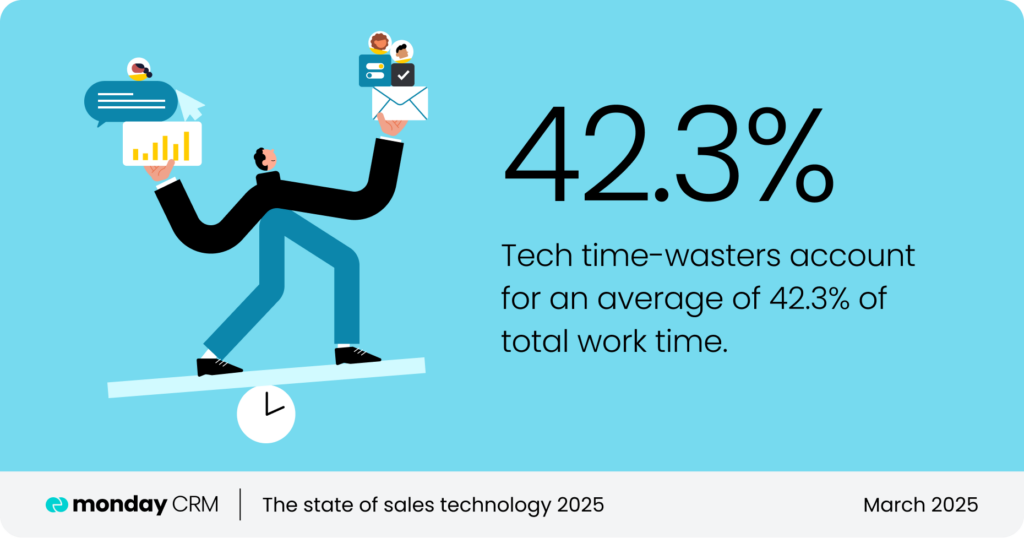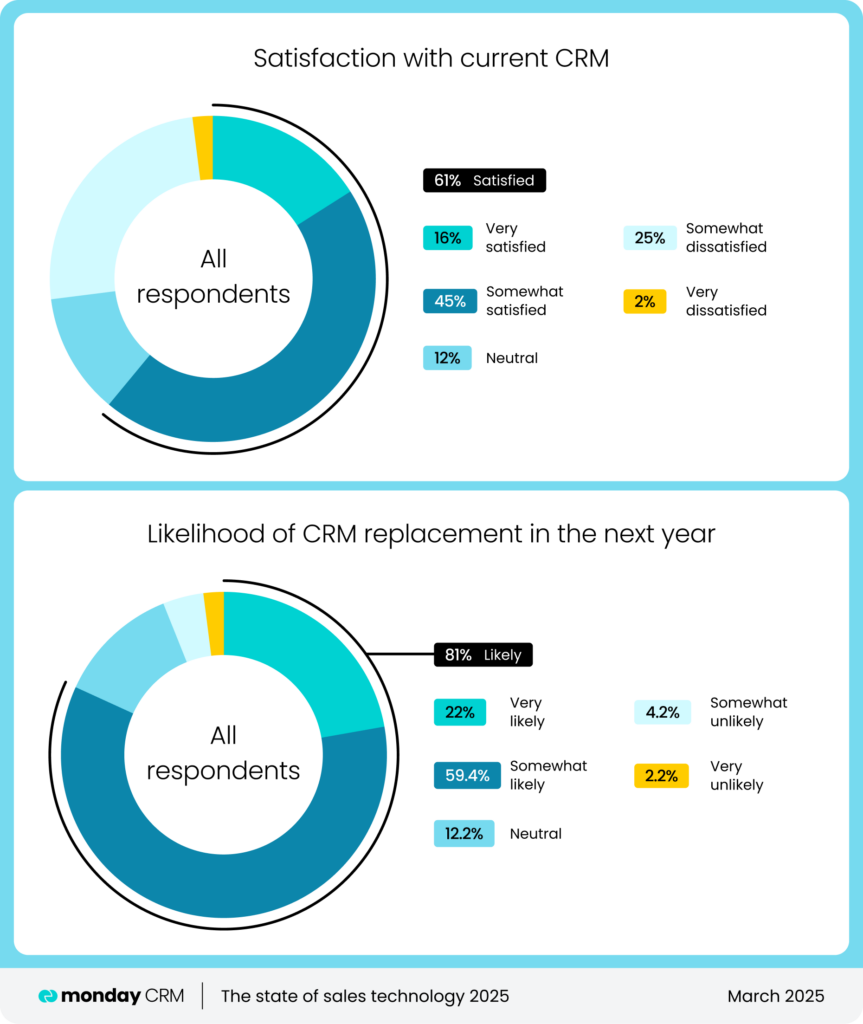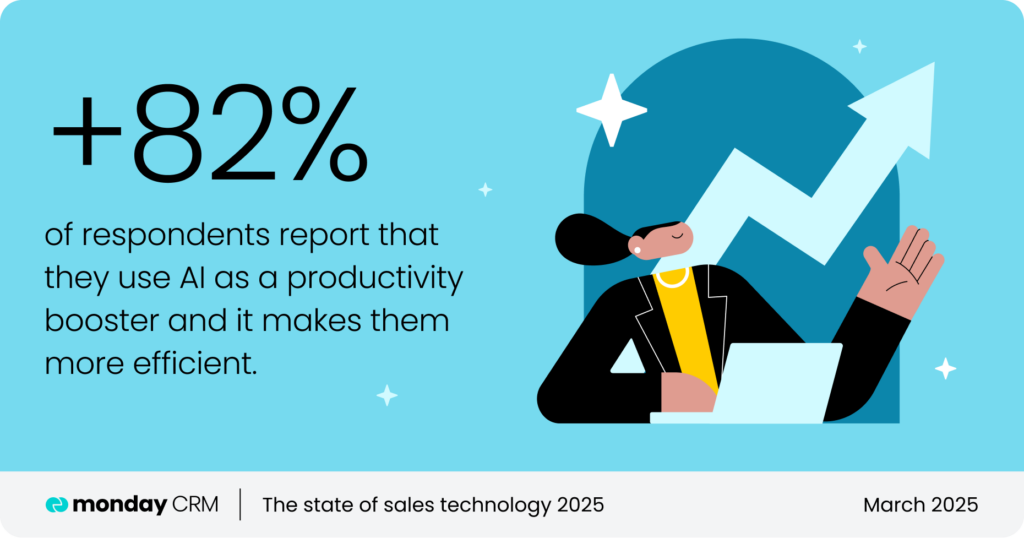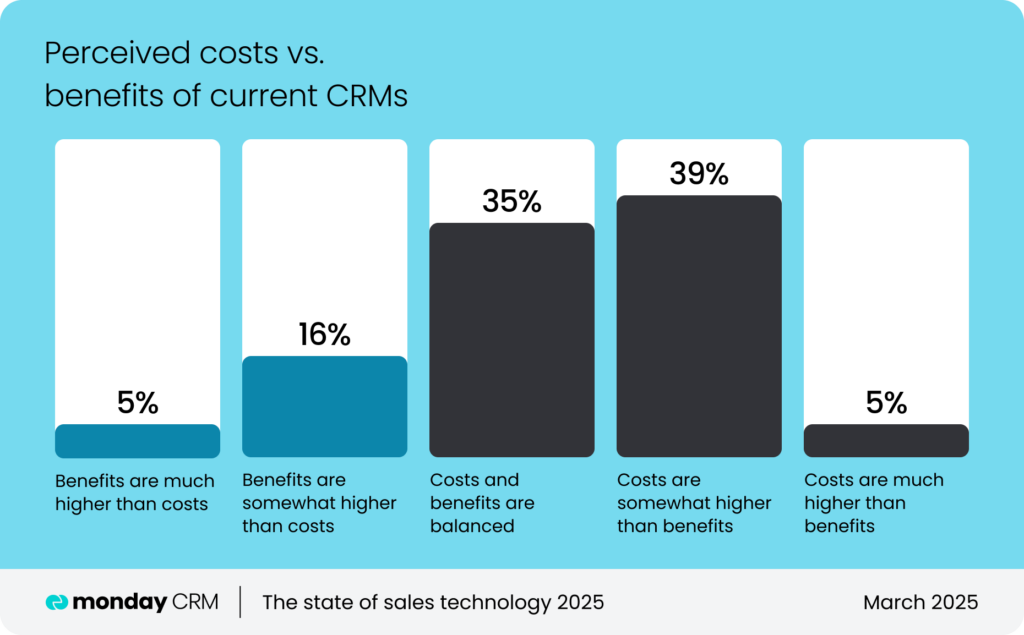Sales tech should make our lives easier and our teams more productive.
That’s the selling point of almost every tool on the market.
Yet, a staggering 42% of the workday is wasted on inefficient technology, according to monday.com's State of Sales Tech report.
For frontline managers and reps, this means endless CRM updates. For executives, it translates to frustrating, inaccurate reporting.

"The R in CRM stands for relationship, not just transaction," explained Jeff Rosenthal, Head of CRM GTM at monday.com. “But most sales tools have forgotten this fundamental truth. They've become glorified spreadsheets that track deals instead of nurturing customer relationships.”
The Relationship Paradox
Maybe “relationship” is the missing piece. The reason so many sales leaders are paradoxically caught between good enough and shiny new object.
The same survey found that 61% of companies are satisfied with their CRM, yet 81% are actively looking to replace it. Clearly, there's a fundamental disconnect between what sales teams need and what they want.

The problem runs deeper than software selection. Most sales tech acts like a band-aid, patching over software inefficiencies with more software. The real issue? A complete misalignment between technology and human workflow.
“The solution shouldn't be 'we just bought a CRM, so now we have to completely restructure how we do business to fit the software,'" said Rosenthal. "Instead, the CRM should adapt to how the company actually operates."
The Mid-Market Squeeze
Nowhere is this more apparent than in mid-market companies. They're too sophisticated for basic tools but too lean to afford complex enterprise solutions. They're left with a high-stakes technology balancing act where every tech decision can make or break growth.
"If you're Amazon or Cisco, you've got entire IT departments to stitch together complex systems," Rosenthal explained. "But mid-market companies? They're just trying to keep things simple and streamlined."
The current landscape forces sales reps into a productivity nightmare. Data entry has become a soul-crushing chore. With dozens of required CRM fields, reps are spending more time typing than talking to customers.

AI can help here, if leveraged strategically. With things like automatic lead follow-up or data enrichment, AI can amplify reps' capabilities and give them more time to build genuine relationships.
The Data Credibility Crisis
While mid-market companies wrestle with tool overload, C-suite executives are fighting their own battle: a full-blown data credibility crisis. Despite massive investments in CRM systems, executives have lost trust in their own data.

"Less than 5% of users actually forecast inside their CRM system," Rosenthal said. "There's zero trust that what's in the CRM is representative of revenue forecast."
Instead, executives are exporting data to spreadsheets and creating parallel information universes that defeat the entire purpose of integrated sales technology.
The result is a corporate version of telephone. Critical business intelligence gets lost in translation, filtered through multiple systems, each stripping away context and nuance.
Executives are left making decisions based on incomplete pictures, hoping they've connected enough dots to see the full landscape.
Three Strategic Shifts for Modern Sales Leaders
Every broken sales tech stack tells a story of missed opportunities and frustrated teams. To transform your data graveyard into a strategic powerhouse, here are three critical shifts that will help your sales org break free from tech-induced gridlock.
1. Relationship Over Transaction
Sales isn't about closing a deal—it's about nurturing long-term relationships. Track the entire customer journey from initial contact through project delivery, contract renewal, and potential expansion.
"I was walking around the sales floor on the last day of the year," Rosenthal said. "Someone got up and hit the gong, and people were clapping. You would think the job is done there, but the real work actually starts the next day."
2. Prioritize Data Integrity
Most CRM systems are designed for managers, not users. This fundamental misalignment leads to incomplete data and sees CRM updates as a compliance chore rather than a valuable tool.
Strategic leaders must reimagine CRM data collection by:
- Developing tools that sales teams actually want to use
- Implementing automatic data enrichment
- Reducing manual entry
- Creating context-rich customer profiles
3. Technology as an Enabler
The most successful companies view technology as a relationship accelerator, not a human replacement. And they focus on getting the best tech, not the most. While investing in the newest, shiniest tech may seem like a smart choice, it isn't necessarily so. Always do a tech audit before adding new tools, because overlapping features and redundant tools are the most common reasons for tech debt.
"AI is an enabler," Rosenthal said. "It's not about replacing reps, but actually amplifying the work that the company is doing."
Look for tools that:
- Understand unique business workflows
- Provide intelligent insights
- Free up human talent for high-value interactions
- Adapt to your company's specific needs
The Path Forward
The future of sales isn't about collecting more data—it's about creating more meaningful connections. Especially for mid-market companies, this means finding agile solutions that can scale without massive technological overhauls.
"We need to look at the entire end-to-end customer journey and operating efficiency, Rosenthal said. "A customer relationship isn't just closing the sale. We've got to deliver things, install things, renew people, manage contracts, and engage with customers post-sale."
Looking for more insights? Sign up for The CRO Club newsletter for trends, tips, and tools to help you tackle the future of go-to-market.


